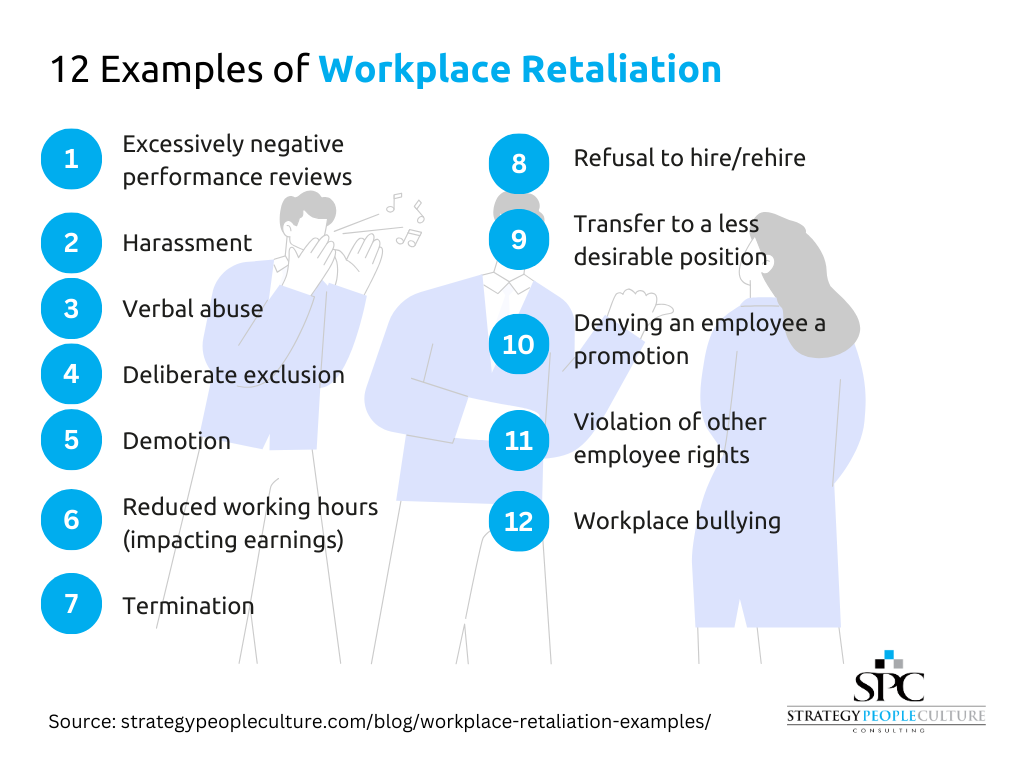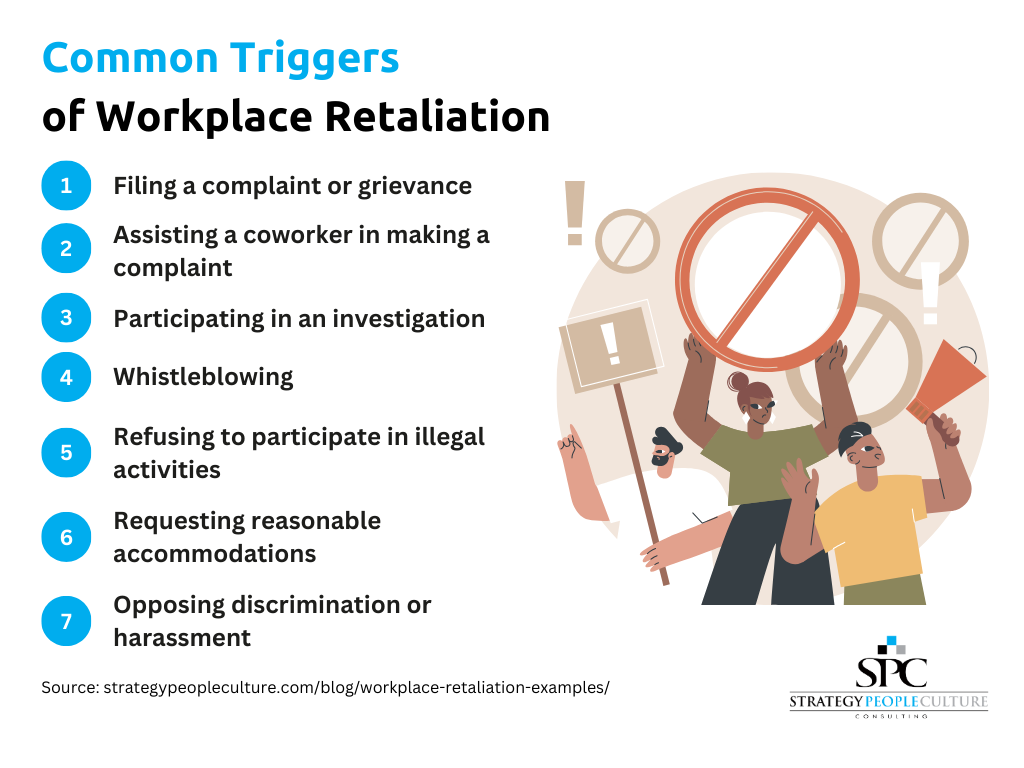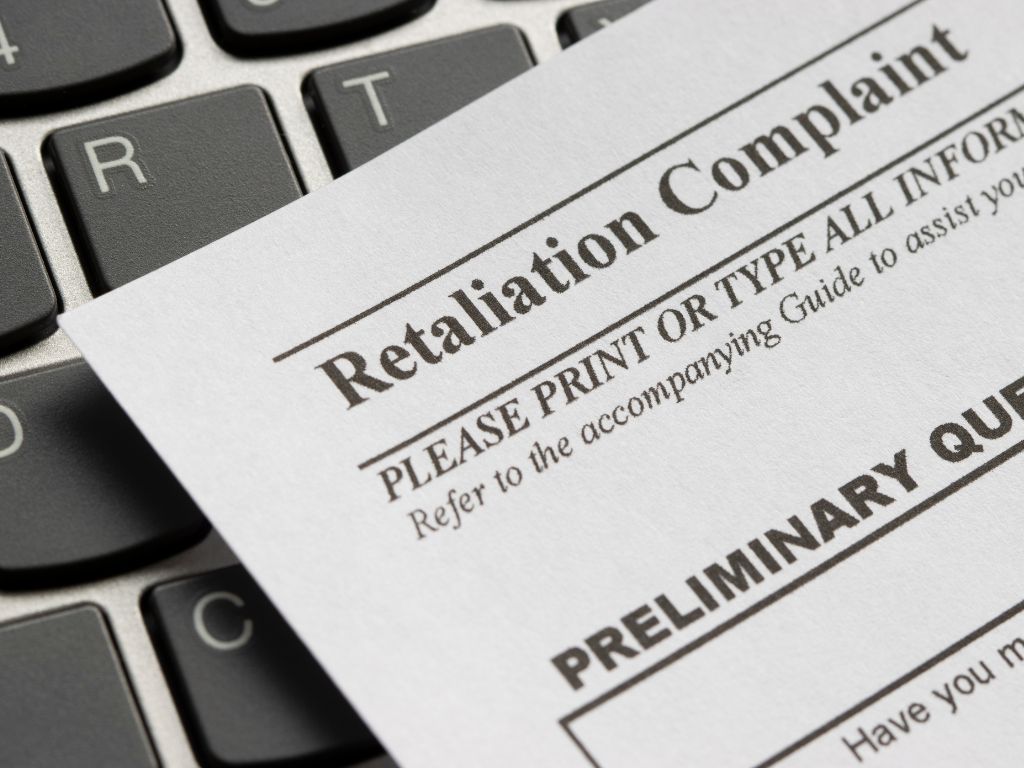What Is Retaliation in the Workplace? and How to Prevent It

Understanding and addressing retaliation is vital for any organization. It not only can cost a business significant money, retaliation has other effects, such as negatively impacting team morale, productivity, and, ultimately, the company’s reputation.
Workplace retaliation occurs when an employer takes adverse action against an employee for exercising their legal rights to raise concerns, file complaints, or support colleagues around issues of workplace sexual harassment or discrimination. This can include job termination, demotion, salary reduction, or creating a hostile work environment.
As an employer and business leader, you may wonder:
- Why is it important to understand and address retaliation in your organization?
- What are the consequences of workplace retaliation when it is not properly addressed?
- How can you effectively mitigate the risk of retaliation and cultivate a resilient and inclusive work environment?
In this article, we will delve into these questions and provide actionable tips for preventing and addressing retaliation in the workplace.
Understanding Workplace Retaliation
Workplace retaliation manifests in various forms, making it crucial to understand its types to identify and address each effectively.
12 Examples of Workplace Retaliation

Understanding these forms of retaliation is the first step toward establishing a safe, respectful, and inclusive work environment. Some of the common examples include:
- Excessively negative performance reviews: Employers might use this tactic to undermine an employee who has voiced concerns, creating an unfair picture of their performance.
- Harassment: This involves subjecting an employee to unwelcomed behavior, often creating an uncomfortable work atmosphere.
- Verbal abuse: It includes inappropriate, disrespectful, or offensive language targeted at an employee.
- Deliberate exclusion: The employee might be intentionally left out of meetings, team activities, or crucial communication.
- Demotion: The employee might be downgraded to a lower position as a form of punishment.
- Reduced working hours: An employer may reduce an employee’s working hours, significantly impacting their earnings.
- Termination: The employee might be fired as a repercussion of filing a complaint.
- Refusal to hire/rehire: An employer might refuse to hire or rehire an employee due to their raising previous complaints or concerns on issues of sexual harassment or discrimination.
- Transfer to a less desirable position: In some cases, an employee might be transferred to a less desirable job or location.
- Denying an employee a promotion: This involves denying deserved promotions to an employee as a form of retaliation.
- Violation of other employee rights: An employer might violate an employee’s rights, such as denying leave requests, as a means of retaliation.
- Workplace bullying: This involves persistent actions intended to belittle, intimidate, or undermine an employee.
Common Triggers

Workplace retaliation frequently arises in response to an employee engaging in what is known as ‘protected activities’. These activities are typically lawful actions taken by an employee that an employer might view as disruptive or challenging. The following are some of the common triggers:
- Filing a complaint or grievance: When an employee raises a formal issue about unfair treatment, discriminatory practices, or unsafe workplace conditions, it may result in retaliation from the employer.
- Assisting a coworker in making a complaint: An employee may face retaliation for standing up for a coworker or assisting them in filing a complaint, even if they are not directly involved in the issue.
- Participating in an investigation: An employee who cooperates with an internal or external investigation into company practices may be targeted for retaliation.
- Whistleblowing: Employees who report illegal activities, corruption, or other unethical behaviors in their organization are often at risk of retaliation.
- Refusing to participate in illegal activities: An employer may retaliate against an employee who refuses to engage in illegal or unethical activities at work.
- Requesting reasonable accommodations: If an employee requests accommodations under laws such as the Americans with Disabilities Act (ADA) or the Family and Medical Leave Act (FMLA), they may face retaliation.
- Opposing discrimination or harassment: Employees who speak out against or resist discriminatory or harassing behavior in the workplace may trigger retaliation.
By recognizing these common triggers, employers can take proactive steps to prevent retaliation, and employees can understand their rights and protections in the workplace.
Legal Implications

When retaliation occurs in the workplace, it doesn’t just pose ethical dilemmas—it also carries severe legal ramifications. In the United States, numerous federal laws, such as the Civil Rights Act of 1964, the ADA, the FMLA, and the OSHA, among others, expressly prohibit retaliation. Violations of these laws can result in significant penalties, including fines, damages, and sometimes even imprisonment.
EEOC states, “The desire to retaliate is a common human reaction, but when done by a management official because employees assert their right to challenge a perceived wrong, the retaliation can establish legal liability.” If an employee experiences retaliation, they have the right to file a lawsuit against their employer. If they can demonstrate that the employer’s actions were, in fact, retaliatory, courts may order the employer to take corrective actions. These can include reinstatement, back pay, or compensation for losses suffered due to retaliation. In some cases, punitive damages may also be awarded where the employer’s actions were particularly egregious.
Real-Life Examples
Dillard’s Inc.
In late April 2023, the EEOC filed a lawsuit against Dillard’s Inc., a national department store chain, for alleged violation of federal law by terminating an employee after her complaints regarding discrimination and pregnancy accommodation.
According to the EEOC’s suit, in February 2020, a longtime sales associate informed her new manager about her pregnancy-related accommodation but faced withdrawal of the same. She was transferred to another department, which negatively impacted her sales. Despite her complaints of discrimination based on her race and pregnancy, Dillard’s reduced her hours and subsequently furloughed her during the COVID-19 pandemic. She was never recalled and was replaced by a less efficient employee in August 2020.
The EEOC is now seeking compensation on her behalf, along with a measure to prevent such incidents in the future.
Downtown Grand Hotel & Casino
The EEOC filed a lawsuit against DTG Las Vegas, LLC; Fifth Street Gaming, LLC; and DTG Las Vegas Manager, LLC (collectively doing business as “Downtown Grand Hotel & Casino”), in early April 2023, accusing them of failing to provide reasonable accommodations to a class of employees with disabilities, interfering with employees’ rights, and retaliating against those who exercised their rights.
According to the EEOC, since at least 2018, the company failed to provide reasonable accommodations for employees with disabilities including — but not limited to — levoscoliosis, sciatica, and cancer.
Furthermore, employees seeking accommodations were exposed to over-scrutiny, disciplinary threats, and even termination. The EEOC is seeking financial compensation for the victims, encompassing both compensatory and punitive damages. Additionally, it seeks injunctive relief against the company to deter any future occurrence of such unlawful conduct.
Psychological and Emotional Impact of Retaliation on Individuals and Organizations

Workplace retaliation inflicts significant psychological and emotional damage on individuals.
- Adverse actions can lead to immense stress, anxiety, and depression.
- Retaliation erodes self-esteem and incites feelings of powerlessness.
- It can even lead to physical health issues over time.
- Isolation from colleagues damages a sense of belonging and harms professional relationships.
- Retaliation fosters a culture of fear and mistrust in organizations.
- Collaboration, innovation, and productivity could be hampered.
- Morale and engagement may take a nosedive as employees question their safety.
- Retaliation can lead to increased employee turnover.
- The organization’s reputation can suffer, affecting its ability to attract and retain top talent, in addition to losing direct customers as a result of associated PR.
- Workplace retaliation can destabilize the entire organization.
Prevention and Mitigation Strategies for Workplace Retaliation

Preventing and mitigating workplace retaliation requires a proactive and multifaceted approach. Below are some strategies to help you build a resilient and inclusive work environment.
Implementing Strong Anti-Retaliation Policies and Procedures
A robust anti-retaliation policy should clearly state the organization’s zero-tolerance stance towards retaliation, outline the procedures for reporting and addressing complaints, and demonstrate the company’s commitment to upholding employee rights and fostering a culture of respect and fairness. The Equal Employment Opportunity Commission on a federal level provides some guidance on retaliation.
Fostering a Culture of Respect, Transparency, and Accountability
Creating a culture of respect, transparency, and accountability means encouraging open communication and upholding ethical standards. It also involves holding all members of the organization accountable for their actions, setting the foundation for a safe and retaliation-free work environment.
Providing Employee Support Mechanisms and Reporting Options
Providing employee support mechanisms and reporting options could include confidential hotlines or online platforms, where employees can report incidents without fear, along with access to mental health resources and counseling to help them cope with the aftermath of retaliation.
Implementing Fair and Thorough Investigation Procedures
When a retaliation report is received, take prompt action. Ensure an impartial investigation process with no bias towards any party involved. Train investigators to handle sensitive information and act objectively. In late 2023, the EEOC issued new proposed guidance suggesting investigations should be done by an impartial party.”
Prioritize Confidentiality and Take Action
If the investigation supports the retaliation claim, take immediate corrective measures, including disciplinary action, job reinstatement or wage compensation for the victim, and anti-retaliation training. Communicate to all employees that retaliation won’t be tolerated and complaints will be addressed promptly. Understanding the rules around confidentiality can also be critical. For example, in 2023, the National Labor Relations Board had a major new ruling in the Stericycle matter.
Educating Employees and Managers about Responsibilities
Employees and managers alike should be equipped with comprehensive knowledge about their rights, responsibilities, and ways to address potential retaliation, fostering a well-informed and proactive work environment.
The Role of Training and Awareness Campaigns in Prevention and Mitigation
Training and awareness campaigns serve to educate employees about their rights, the organization’s policies, and the steps to take when faced with retaliation, thereby fostering an enlightened, empowered, and retaliation-free work environment.
Building a Resilient Work Environment

Creating an inclusive work environment is crucial for building resilience in the workplace. It involves valuing and celebrating diversity, promoting equal opportunities, and addressing unconscious biases. Leadership plays a pivotal role in preventing workplace retaliation and fostering resilience by setting the tone and holding violators accountable. Continuous monitoring, improvement, and training sessions help maintain a healthy, inclusive work environment.
Conclusion
In conclusion, workplace retaliation presents a significant threat to the health of both individuals and organizations, leading to psychological distress, hindering productivity, and tarnishing a company’s reputation. However, by recognizing the common triggers and legal implications of retaliation, businesses can take proactive steps to prevent it.
Workplace retaliation is a complex issue that necessitates quality training and a strategic approach, and this is where Strategy People Culture can provide invaluable support. Let’s create a future where every employee feels valued, heard, and protected.
We invite you to schedule a consultation with us to discuss how we can help your organization prevent workplace retaliation and foster a supportive, inclusive, and resilient work environment. Call (833) ROCK – SPC today.
